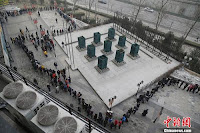Journalist turned writer Li Chengpeng held a book signing event on Sunday in Beijing to promote his new essay collection 'Everyone in the World Knows'. This was the second leg of his campaign for the new book. Last week in Chengdu, he was told not to say a word during the entire process. He was even denied to say 'Good morning' at the beginning of the event. He also was not allowed to say 'thank you' to his readers. That was a scary scene.
In his book, he pointed out absurdities in some seemingly normal every life. It encourages readers to reflect on simple facts, and tell right from wrong. It is not political, not even toughing any ongoing events. However, it tries to bring out people's own judgement and feeling, independent from politics.
Readers lined up for 3 hours to get book signed. It is a very cold winter day, single digit in Fahrenheit. It is also a 'crazy bad' smog day, with PM10 number shooting 1,000.
Half way through, one Maoist punched Li when he was signing for a reader, then disappeared. There were dozens of uniformed police and security at the scene to monitor Li and intimidate readers. Police did not do anything to stop the attack or the attacker. It was a scary scene.
Towards the end, another Maoist threw a chef's knife at Li. The knife barely missed Li. This time, the attacker was subdued by readers, and handed over to police. The attacker was let go by the police, no charge was filed. It was a scary scene.
However, the most scariest scene of all, was that over 1,000 readers showed up in that police trap, in a prohibitive cold and polluted day to support Li, with over 7,000 book signed. Frankly, it's not that a great writing, or even not some great subjects to be read. There was nothing really intriguing, provoking, or even any where sensational. Li himself is a soft-spoken thinker advocating for evolution rather than revolution. Li campaigned for a lower level delegate two years ago. However, when the Party passed a message of disapproval, he immediately abolished his campaign. Over 1,000 readers showed up in defiance, despite police harassment and harsh weather, only because Li was perceived to be a person with value. Over one thousand ordinary people waited more than three hours outdoor to support a fairly moderate writer, just because it was 'a different voice'. It's a vivid testimony on how hard people's resentment has been looking for a vent.
That, is the most scariest scene.






